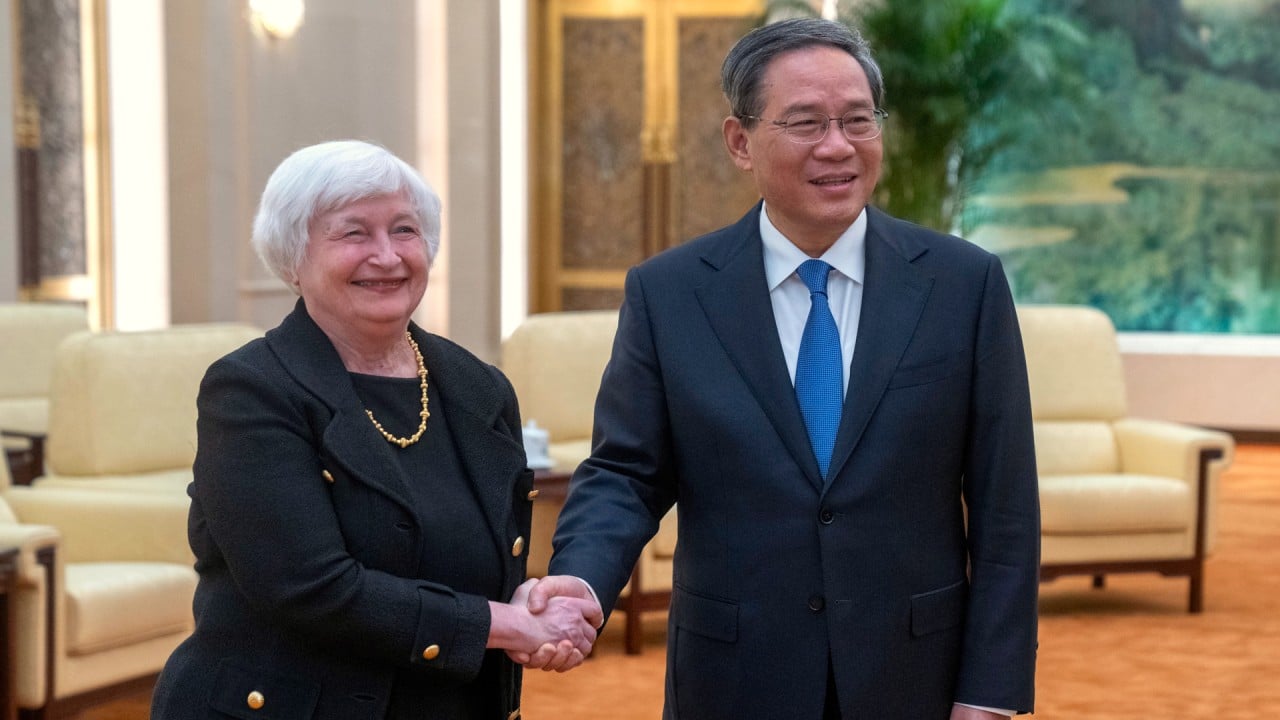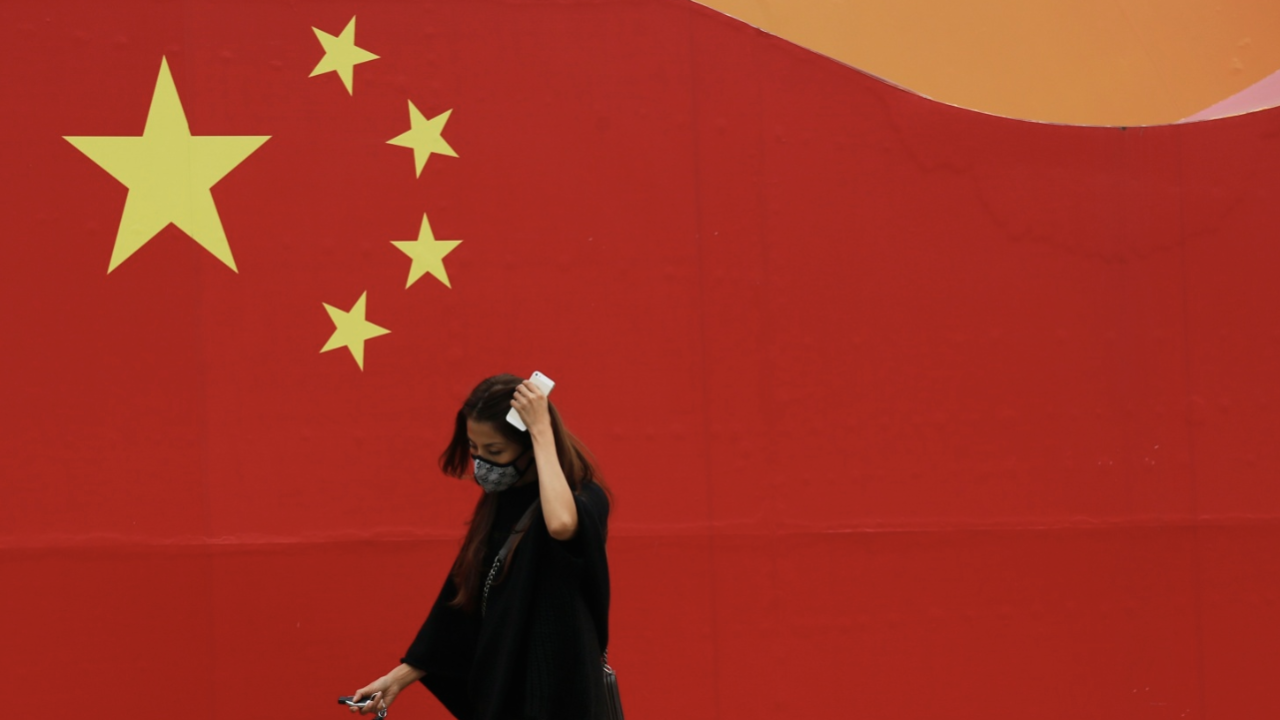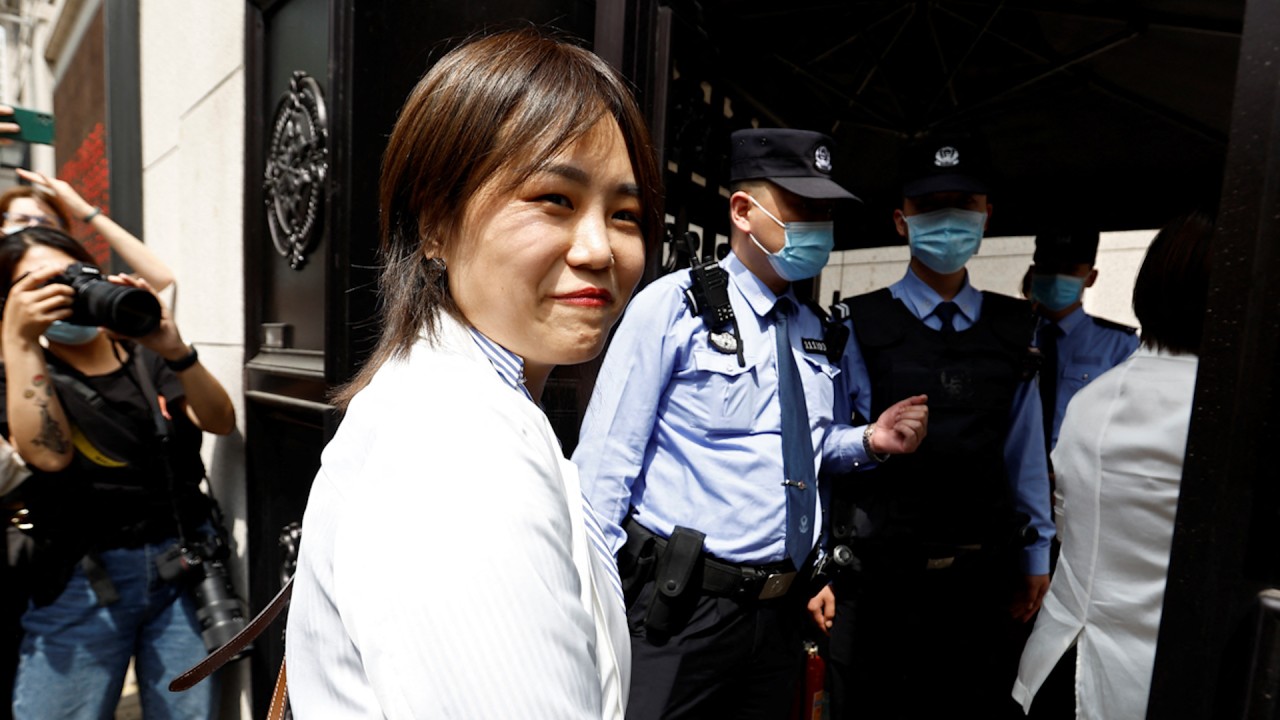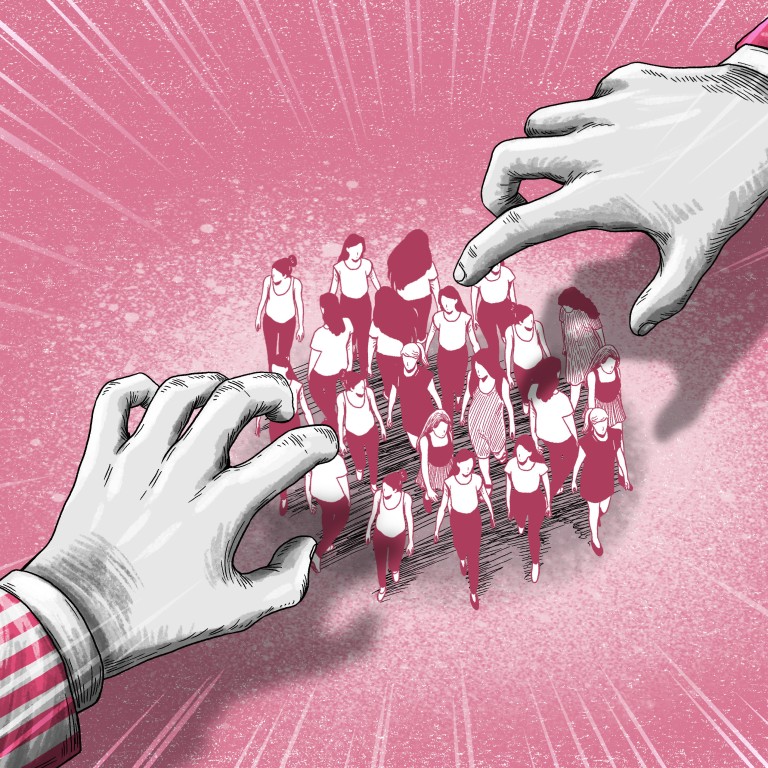
How Janet Yellen’s women’s power lunch exposed China’s divide over women’s rights
- US treasury secretary held several meetings on recent Beijing visit but only an all-women gathering drew ire from nationalists on social media
- ‘I see it all the time when I’m almost the only woman in the room,’ Yellen tells dining companions. ‘I’m sure many of you have that same experience.’
According to the US Treasury Department, the women discussed the Chinese economy and “opportunities to increase the representation of women in the workforce, including in leadership positions”.
“I see it all the time when I’m almost the only woman in the room,” Yellen told the women, according to foreign media reports. “I’m sure many of you have that same experience at decision-making tables.”
It all started with the online circulation of a photo of the lunch in which elegantly dressed women sat at a table with the 76-year-old white-haired Yellen.
While the identities of most of the nine guests could not be confirmed, one was Liu Qian, managing director of The Economist Group in Greater China, who posted on Twitter that Yellen was an “inspirational role model”.
Absence of women in China’s new leadership elite a ‘step backwards’
Liu tweeted that she had long admired the economist’s work “on labour and macro, academia and policy” and it was “an absolute honour” to dine with her.
When challenged by a netizen about why she agreed to dine with Yellen, she replied on Weibo that Yellen had been friendly to China.
The lunch picture and screenshots of their posts were reposted on Chinese social media, generating a flood of criticism from nationalists.
Despite not knowing exactly what the attendees said at the lunch table, they called the women radical feminists, traitors and American spies.
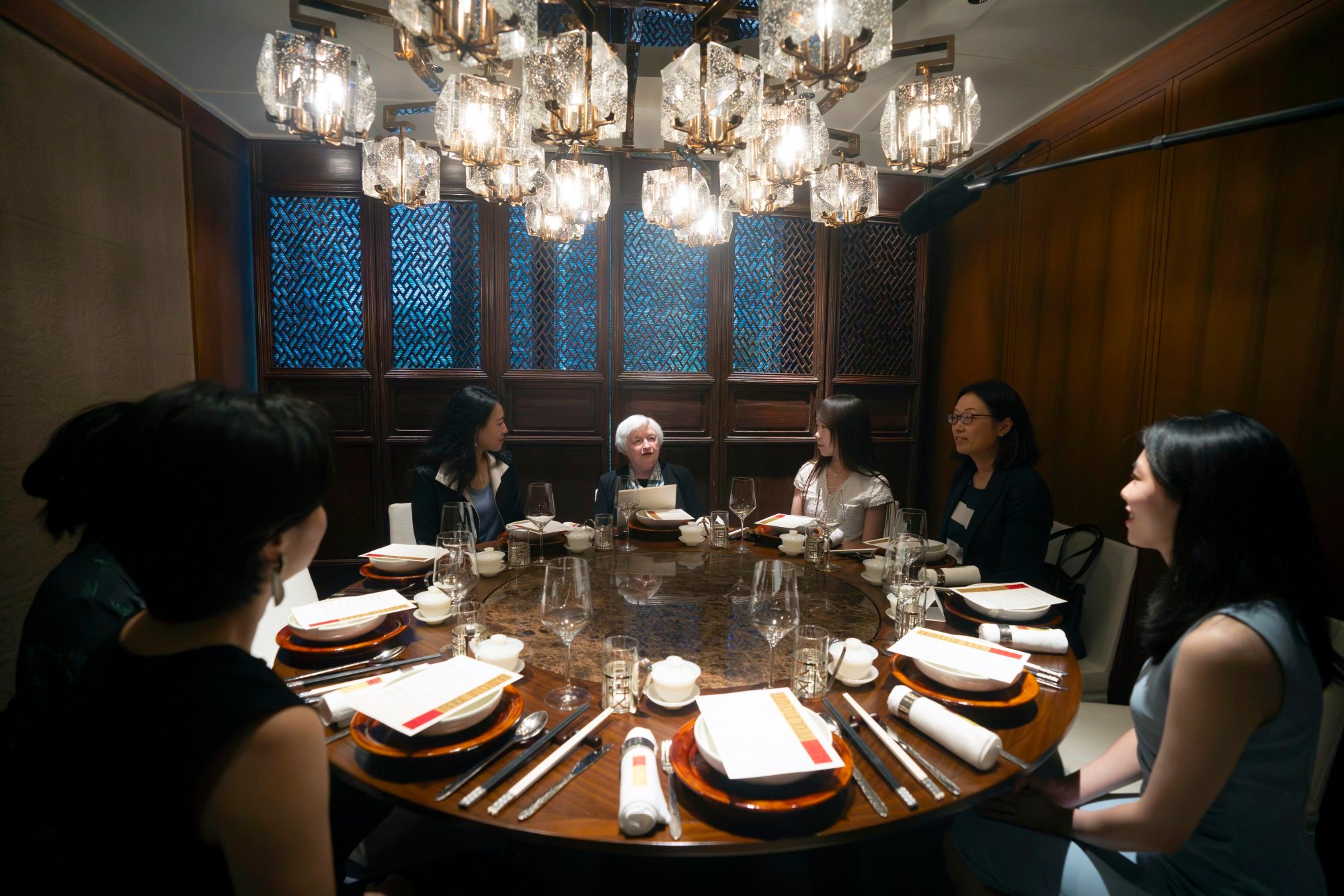
“There’s no such thing as a free meal,” posted Shen Yi, a professor in international politics at Fudan University in Shanghai who has more than 2 million followers on Weibo.
“They’ll need to deliver KPIs [key performance indicators] in exchange,” he added, implying the women would have to give something to the US government. The post received more than 8,000 likes over four days from July 9.
Shen’s remark fed a perception widely held by both nationalistic thinkers and government officials in China, that Washington was seeking to chip away at the legitimacy of the ruling Communist Party by differentiating the government from its populace.
China has openly accused top diplomats under both the Trump and Biden administrations – from Mike Pompeo to Antony Blinken – of seeking to “cut off the blood-and-flesh connection” between the party and the Chinese people.
‘Abused, threatened and violated’: women’s rights, gender equality battle takes centre stage
In June last year when asked about an earlier speech by US Secretary of State Antony Blinken, Zhao Lijian, then a spokesman with the Chinese foreign ministry, accused Blinken of “attempting to sever the blood-and-flesh bond between the CPC and the Chinese people”.
In that speech delivered at George Washington University in late May 2022, Blinken said Washington had profound differences with the Chinese Communist Party and the Chinese government, but those differences were not between the two peoples.
“The American people have great respect for the Chinese people,” he said.
Well before Yellen’s lunch, feminism was among the issues Chinese President Xi Jinping had viewed with great suspicion through the lens of ideological confrontation with the West.
In a speech in November 2018, Xi told cadres at the official All-China Women’s Federation to “tightly unite” around the party, warning them against acting like a “foreign feminist organisation” or “rich ladies’ club”, according to a compilation of Xi’s discourses on women and children work from 2012 to 2023 published by the Central Party Literature Press last month.
In another speech in 2018, Xi said the group should be vigilant in facing “serious and complicated political struggles” as “foreign hostile forces” would try their best to hamper China’s rise to a strong power.
Yun Sun, director of the China programme at the Stimson Centre in Washington, said Yellen’s lunch meeting was not “abnormal or out of protocol”.
“Throughout her tenure, Yellen has always been encouraging [the] female role and voice in her fields and it is not the first time Yellen met with foreign female economists during her visit,” Sun said.
“What is more interesting is why the Chinese female economists were criticised so severely by the netizens for the meeting.
“I suspect people see the meeting and the message as another attempt by the US to undermine the current political system and norms and to act as a thinly veiled criticism of [Xi] and the male-dominated Chinese politics today,” she said.
Chinese feminists squeezed by state but ‘anger will find a way out’
As one of the 13 women in Biden’s 25-member cabinet, Yellen is the first woman to head the US Treasury. The government has introduced its first national gender strategy and made a record funding commitment of US$2.6 billion to promote gender equality abroad.
In the party’s top decision-making bodies, both the seven-member Politburo Standing Committee and the 24-seat Politburo are now filled exclusively with men.
In the Central Committee, women have 11 of the 205 seats. In 2017, the committe had 204 membrs, of which 10 were women.
The UN Committee on the Elimination of Discrimination against Women noted that the representation of women in political and public life had generally increased in recent years in China.
However, the committee was concerned that women represented only 26 per cent of deputies to the 14th National People’s Congress, the nation’s top legislature, and that since October there had been no women in the Politburo.
George Magnus, a research associate at Oxford University’s China Centre, said the social media backlash against the Yellen lunch was “astounding”.
“Yellen had 10 hours of bilateral talks over two days with top male leaders without controversy. Yet a meeting with a few women to discuss economic issues and policies triggered a storm of protest, and allegations of ‘traitor’ aimed at the women,” Magnus said.
How prenups and dowry laws in ancient China empowered women – on paper
“Mao said women hold up half the sky, but there are clearly still some very rough edges to the acceptability and treatment of women in society and in government.”
After the Communist Party came to power in 1949, Mao Zedong rallied women to join the labour force to boost production, saying, “Whatever men comrades can accomplish, women comrades can too”, and “women hold up half the sky”.
China’s first constitution enacted under the party stipulated that “women enjoy equal rights with men in political, economic, cultural, education and social life”.
In recent decades, women’s participation in economic activity in China has been one of the highest in Asia.
However despite the policy commitments and high labour force participation rates, talk of gender equality have not translated to top party positions or high political office for women.
The “Iron Lady” played a leading role in negotiations for China to join the World Trade Organization in 2001 and headed the national battle against Sars (severe acute respiratory syndrome) in 2003.
She joined the Politburo in 2012 and became just the sixth woman to sit on the body since the People’s Republic of China was founded – and three of her predecessors were the wives of top leaders.
Her achievements contrast with prevailing political sentiment under Xi Jinping. Since Xi took the helm in 2012, he has emphasised the traditional role of women as the good wife and mother in the family.
“We stress women’s roles in society. We also stress their roles in the family. It concerns family concordance, social harmony and the healthy development of the next generation,” Xi told cadres of the national women’s federation in 2013.
‘Unwanted male gazes’: women-only hotel offers sanctuary for guests from love rats
Such talk has become more frequent in recent years. At a time when China is struggling with a record low birth rate, women are being encouraged to take on more traditional caregiving roles.
Chen Daoyin, an independent political scientist and former Shanghai-based professor, said China’s state media did not air criticism of the Yellen lunch, suggesting Beijing knew about the meeting and allowed it to proceed.
“A few internet key opinion leaders decided to ride the wave of nationalism because they bet anti-US and antifeminism are politically correct and in line with Beijing’s perception that feminism is a Western plot,” Chen said.
“China’s women’s organisation is a party apparatus, working as a bond connecting the party with the masses. It’s completely different from Western feminist organisations.
“The rise of feminism requires women as an independent political force to fight for liberalisation and political, economic and social equality. The nature of feminism is the defiance of authoritarianism, which means the party would never let it prosper.”


